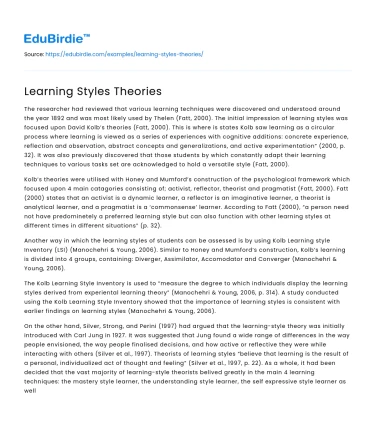The researcher had reviewed that various learning techniques were discovered and understood around the year 1892 and was most likely used by Thelen (Fatt, 2000). The initial impression of learning styles was focused upon David Kolb’s theories (Fatt, 2000). This is where is states Kolb saw learning as a circular process where learning is viewed as a series of experiences with cognitive additions: concrete experience, reflection and observation, abstract concepts and generalizations, and active experimentation” (2000, p. 32). It was also previously discovered that those students by which constantly adapt their learning techniques to various tasks set are acknowledged to hold a versatile style (Fatt, 2000).
Kolb’s theories were utilised with Honey and Mumford’s construction of the psychological framework which focused upon 4 main catagories consisting of; activist, reflector, theorist and pragmatist (Fatt, 2000). Fatt (2000) states that an activist is a dynamic learner, a reflector is an imaginative learner, a theorist is analytical learner, and a pragmatist is a ‘commonsense’ learner. According to Fatt (2000), “a person need not have predominetely a preferred learning style but can also function with other learning styles at different times in different situations” (p. 32).
Another way in which the learning styles of students can be assessed is by using Kolb Learning style Inventory (LSI) (Manochehri & Young, 2006). Similar to Honey and Mumford’s construction, Kolb’s learning is divided into 4 groups, containing: Diverger, Assimilator, Accomodator and Converger (Manochehri & Young, 2006).
The Kolb Learning Style Inventory is used to “measure the degree to which individuals display the learning styles derived from experiental learning theory” (Manochehri & Young, 2006, p. 314). A study conducted using the Kolb Learning Style Inventory showed that the importance of learning styles is consistent with earlier findings on learning styles (Manochehri & Young, 2006).
On the other hand, Silver, Strong, and Perini (1997) had argued that the learning-style theory was initially introduced with Carl Jung in 1927. It was suggested that Jung found a wide range of differences in the way people envisioned, the way people finalised decisions, and how active or reflective they were while interacting with others (Silver et al., 1997). Theorists of learning styles “believe that learning is the result of a personal, individualized act of thought and feeling” (Silver et al., 1997, p. 22). As a whole, it had been decided that the vast majority of learning-style theorists belived greatly in the main 4 learning techniques: the mastery style learner, the understanding style learner, the self expressive style learner as well as the interpersonal style learner (Silver et al., 1997).






 Stuck on your essay?
Stuck on your essay?

